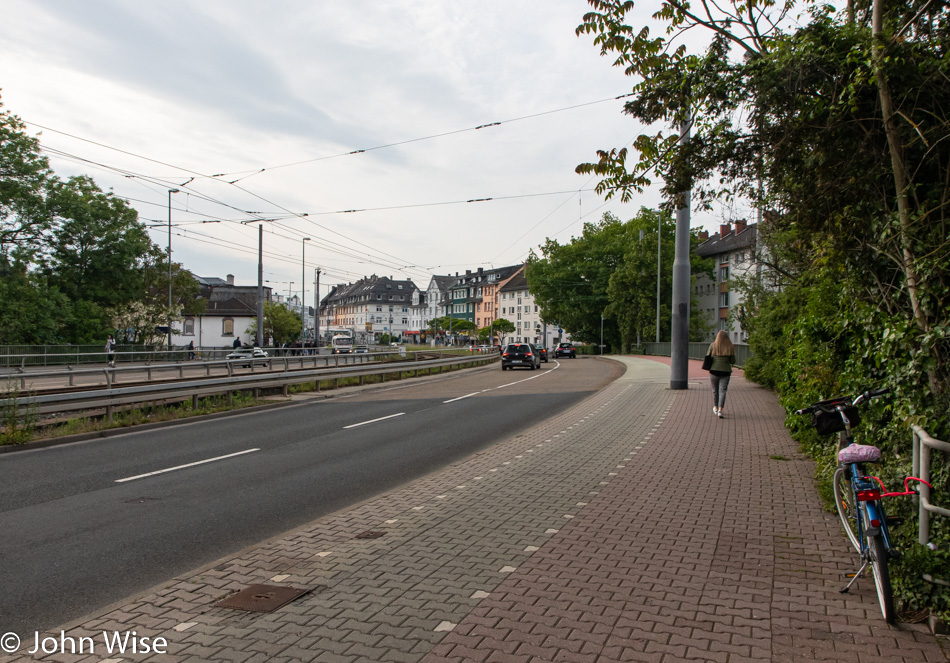
This will be Caroline’s first full day in Frankfurt, and although we talked way too late into the night with the Engelhardt’s we were up early and ready to go before anyone else. After a cup of coffee and some magnificent German wholegrain Brötchen, it was time to head down the road. The girls took a taxi to pick up their mom from her temporary lodging where she had stayed while Stephanie and Klaus had been visiting Katharina in New Zealand for the past month. Klaus was waiting for the tow truck to pick up his car, the battery died while they were away on vacation, and I was moving on foot from Heddernheim to Bornheim (a walk of about 5.5 miles or about 9km). Seems that this type of long walk across Frankfurt is unheard of, but following my two weeks of wandering around Berlin, Erfurt, Mühlhausen, and Bayreuth, I needed to keep up my momentum, if for no other reason than to work off my culinary indulgences that know few bounds.

Along the way, I found myself distracted by my thoughts about European integration, the formation of the EU, and its stability. Something that feels obvious in major cities that host larger, diverse populations where prosperity is being cultivated is that there is most likely an educated populace. Swimming with other well-educated people in these fishbowls, I feel that many are mostly unaware of how isolated their fellow citizens who live outside of the economically thriving business zones are. Prosperity to the person in the city feels natural and easily attained, but this blinds them to the reality of the person in the town just 30 miles away who doesn’t see an opportunity for themselves or their children. Knowing that their neighbors in the big city are doing better than them, they must find a scapegoat to explain their misfortune. The easiest person to victimize instead of taking the blame for neglecting one’s own failures is the foreigner who is being cast as the usurper of “all the good jobs.” Certainly, it is not the foreigner stealing anyone’s job, nor is it strictly the person who neglected their own relevance regarding job skills in a complex work environment; it is also the failure of government, business, and mass media to apprise the population of the importance of more than mindless bureaucracy, low-cost credit, and some new reality star.
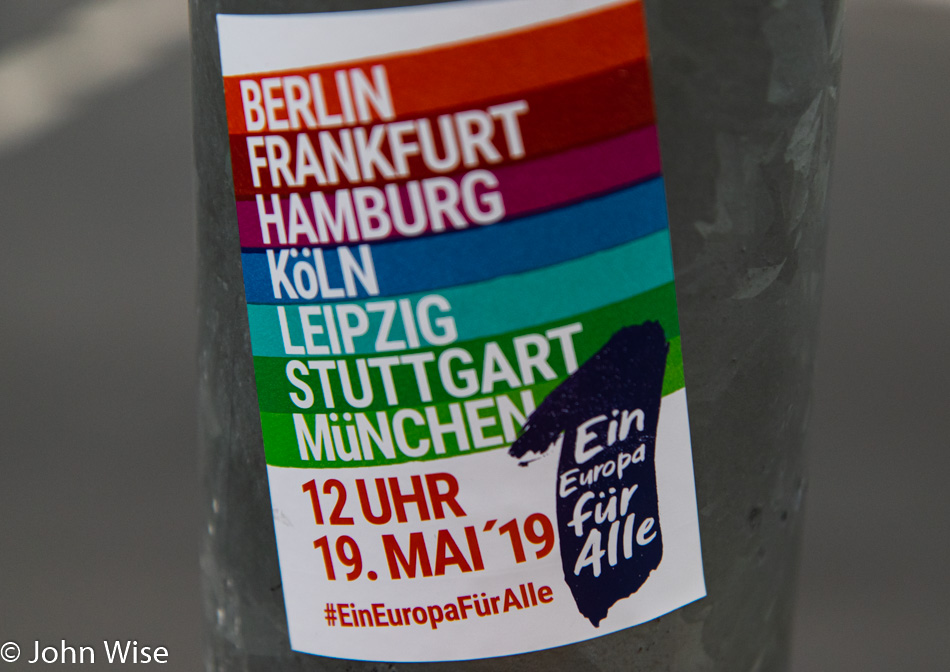
The reality is that those in the major population centers with greater earnings potential can afford greater comforts, but this comes at the expense of having free time. With this exchange of time for money to afford a higher cost of living, new clothes, and a car that better represents their status, along with eating out and requiring someone else to do their laundry and clean their home, there are opportunities for those who will wash dishes, care for plants, walk their dogs, and maintain the amenities of the services that are making living in an expensive location worthwhile.
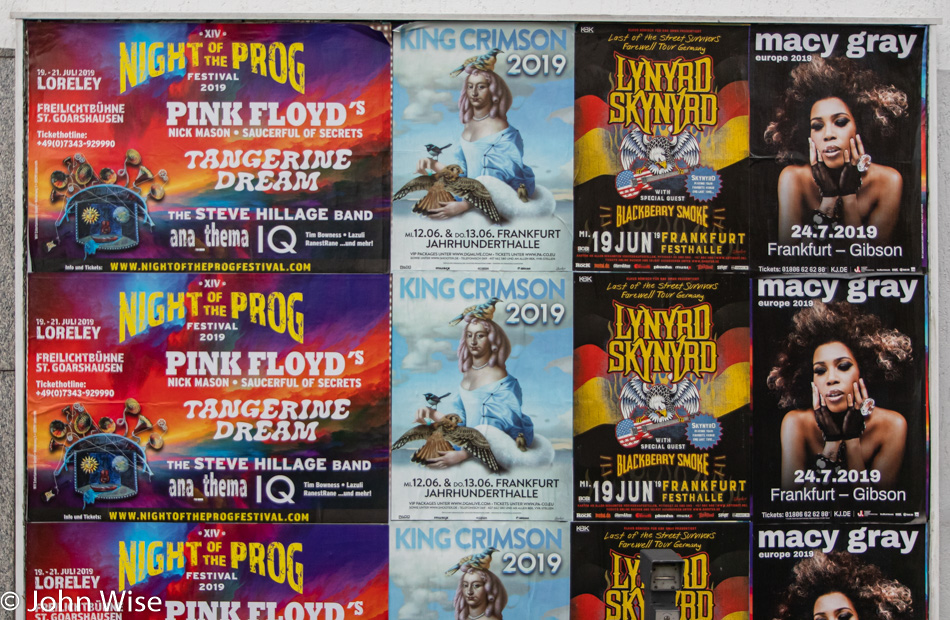
This situation, though, has transparent and opaque elements to those who are looking in from the outside. When visiting the city, they witness great luxury but do not see the hidden effort and so the simpleminded can only assume that this is a version of normal that is anything but to them. From here, resentment festers, and the serpent’s head of populism starts to stoke the fires of nationalism. If those who are benefiting the most from prosperity fail to understand this equation and fail to work on a solution to bring at least some small level of enlightenment to the masses, they will certainly pay the price for their arrogance in ignoring those capable of abhorrent destruction.
Here in Europe, there needs to be a growing awareness of understanding what’s being worked against European interests. Outside of diplomatic channels that happen between travelers and traders, America is pushing the dialog to the right while trying to influence Europe from within. The goal, in my opinion, is nothing less than the dissolution of the EU. Constant media chatter in the United States about the failures of Europe and the deep troubles of its immigration problems are near-daily fare to the American consumer of trash television. In contaminating the conversation and taking to the street level within communities, thus bypassing traditional media channels while simultaneously inferring that those sources of news are fake there is a nefarious effect of poisoning the intellectual and dialectic environment. This opens the door to America at least maintaining the 2nd largest economy as China moves into the position of the hegemon while hoping to see a fractured Europe hurting its own potential economic significance.
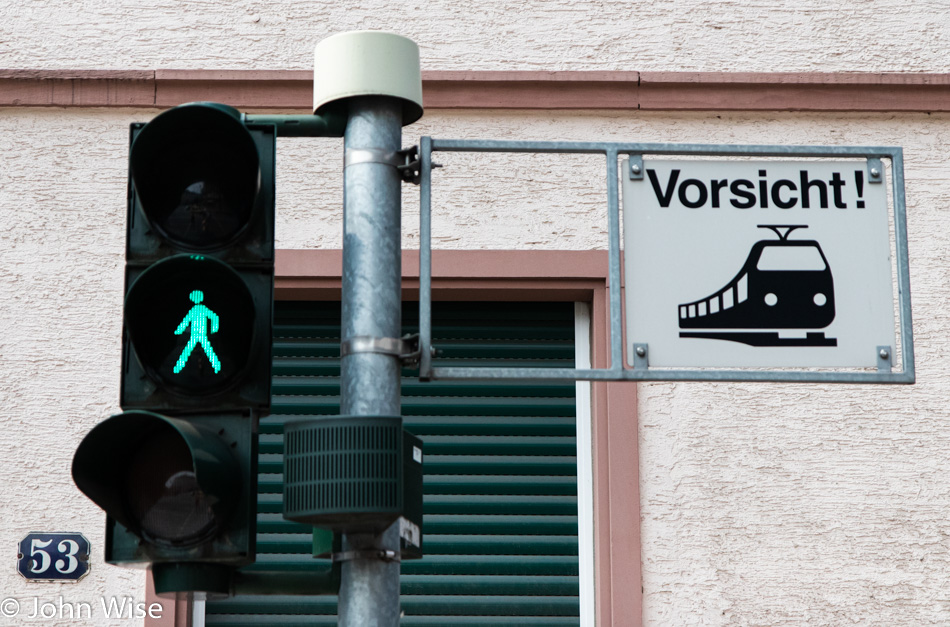
Why is America acting in this capacity following over 80 years of global benevolence? The answer might be found along the lines that America has failed at acculturating itself to an advanced education system and a viable job training infrastructure. We exploit the fact that people need jobs and we force them to amass debt in order to obtain almost any type of skills for well-paying work that extends beyond the minimum wage. Having failed to invest in serious training and turning education into a profit center, we neglected to support intelligent, creative tradesmen who could help build infrastructure such as the one Germany has been creating for the last 70 years following World War II. The importance of this is evident from the fear being shown by certain powerful factions within the United States who are working to destabilize other players on the world stage so that it might use its vast military power and strength to wreak havoc on other lands thus allowing America to direct the political narrative and consequently the economic one also.
Europe is at a juncture in its history where creating a successful European Union, while tenuous and fraught with uncertainty, is an experiment that, for the sake of future generations, should be a goal worth striving for. The results have been seen by anyone visiting Europe in the past years; for example, look at the city I’m in today. Frankfurt is the first place on the continent that might be considered an American city. From the purely unscientific method of casual observation, there is a diversity here similar to that of Los Angeles. The language of Frankfurters is also very mutable, with people dropping German greetings in favor of Hi instead of Hallo and Yes instead of Ja. While they may not be fully aware of the particulars, it is the diversity of Frankfurt’s population that has created a food and cultural wealth that allows people of the region to experience other cultures while keeping their daily experience full of surprises, which translates into constant learning opportunities.

Take Adem’s Fruchte-Bazaar on Eschersheimer Landstraße where this Turkish-owned fruit and vegetable shop features produce from Germany, Spain, Colombia, South Africa, France, Italy, Israel, Peru, New Zealand, Brazil, Costa Rica, South Africa, Mexico, Portugal, and Morocco. I have to wonder how many young Europeans are taking for granted their easy access to pomegranates from Peru, avocados from Mexico, or pineapple from Costa Rica. The argument against this type of trade doesn’t take into account the number of flights that are moving goods and passengers between countries that Europe is trading with, and so filling cargo holds with perishable food items where hard currency may be hard to come by to pay for advanced products from the EU is likely a great trade deal for its partners on other continents.
Walking across the financial capital of Europe I was passing the area that at one time was part of the American military properties that were scattered across Germany. A new building I couldn’t recognize from our visit last year drew my attention, and I was just about to photograph it when, on the assumption that a young man about to pass me might be a student there, I asked about this place.
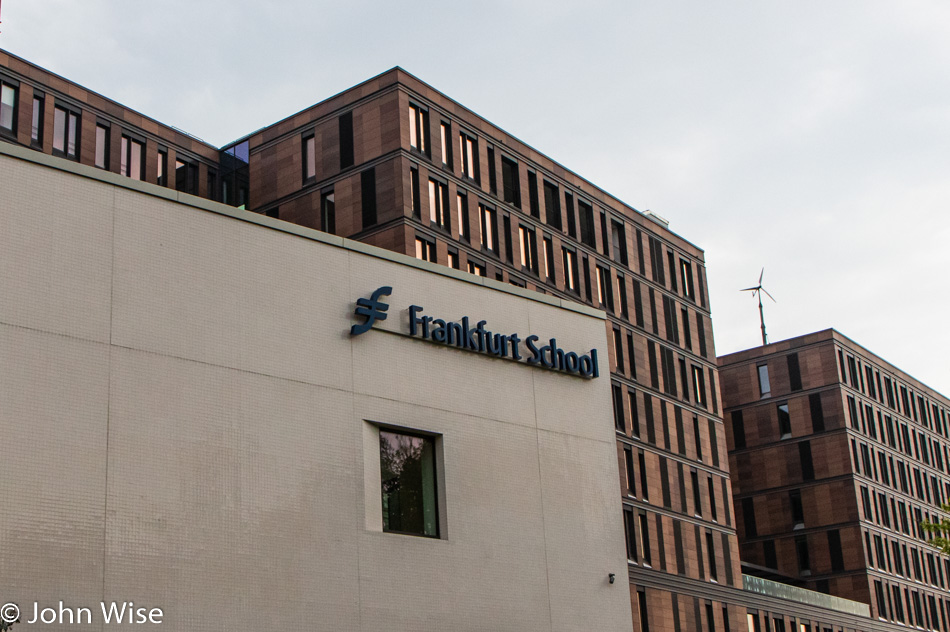
His name is Max, and he’s studying here at the Frankfurt School of Finance and Management to acquire his master’s degree. We ended up talking for nearly 20 minutes, and if I wasn’t running late to meet up with my mother-in-law I would have taken him up on his offer to give me a tour of the impressively large facility. He pointed out how the five main structures represent the five principal continents as they are counted in Europe (in America, the schools teach that there are seven). I asked him what he thought about living in Germany as a 23- or 24-year-old European. He’s optimistic about the future of Europe while simultaneously nervous about Brexit and the push from the United States to destabilize the process of European integration. Interestingly, he referenced his country not as Germany but as Europe. He is also aware of the fear coming from the elderly due to social changes and the risk of climate change. He recently listened to a talk from AFD (Alternative für Deutschland, a party with seats in the federal government, considered to be a right-wing extremist group aligned with ideas that were popular with Hitler et al.) at the school that was part reasonable and part fantasy as he feels the need to know all sides that are acting as forces upon the future. Max also spoke to me about his concern for the environment and how Greta Thunberg has inspired a young generation, especially the activism among young people participating in Fridays for Future.
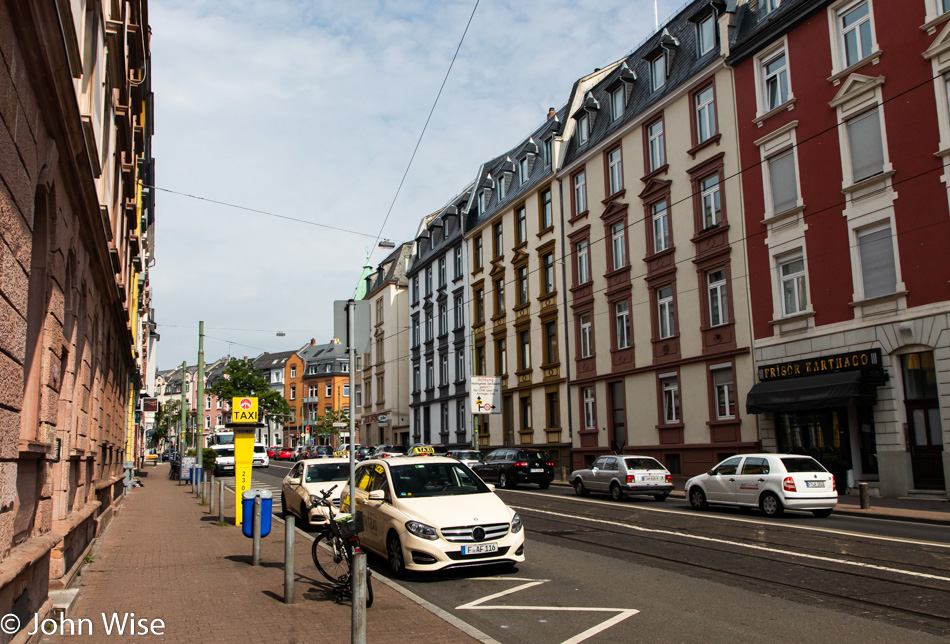
With that, I excused myself from this most gracious man and continued on my walk across Frankfurt. It seems appropriate that in this financial capital of Europe, the economy and its consequences should be on people’s minds and not only those who occupy ivory towers and the offices of government. Like our environmental issues, it is the inaction and laissez-faire attitudes of career workers who are more concerned with job security than the issues they are supposed to be focused on, but all too often, I encounter attitudes of people asking why any of this matters to me and what could they possibly do about the bulwark that is blocking our potential momentum? Defeatist attitudes are not the ones that throw off the tyranny of laziness and blind acceptance.

Time to turn off the two-hour pondering about the economy of Europe as I finally reach Saalburgstrasse in Bornheim. My mother-in-law, Jutta, looks great. While she goes to the assisted living place kicking and screaming against the idea when Klaus and Stephanie go on vacation, the socialization can be seen in her ability to be engaged instead of drifting into herself when she’s alone. The bad part of the experience is that Jutta sees the place as a kind of rehabilitation center and, as such, feels perfectly justified staying in bed and getting no exercise. Talking further with her is revealing as, in her eyes, this center is just shy of being a kind of prison for old people, but then she realizes that her vocalized disdain for “old” people should probably include herself.
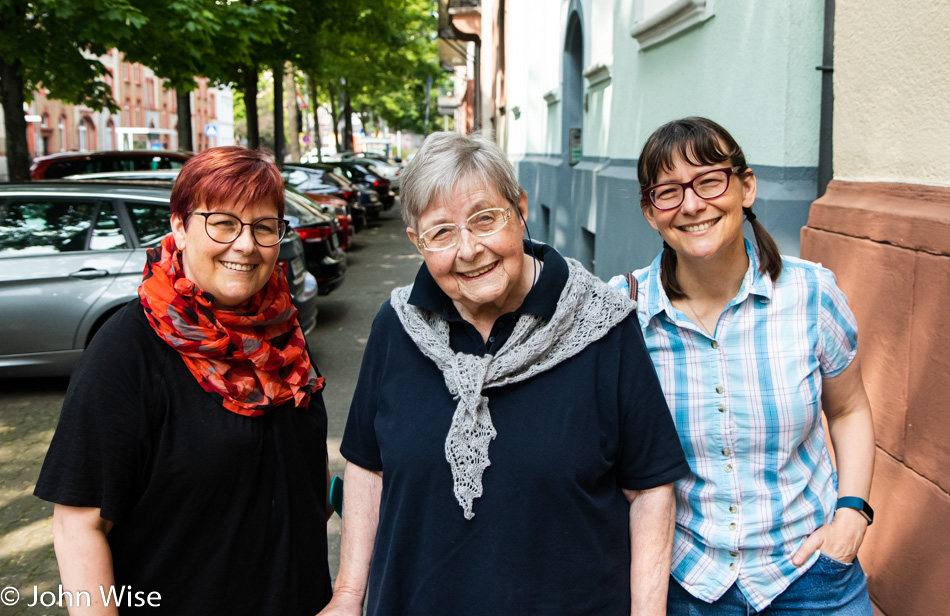
So we took her out for a freedom walk in order to get some lunch and a coffee. From there, Stephanie had to take off in preparation for her return to work tomorrow, so the three ladies walked back to Jutta’s apartment while I finished some writing. Fifteen minutes later, I was knocking on the door. Stephanie was just leaving, and it wouldn’t be ten more minutes before Jutta was succumbing to the need for a nap.
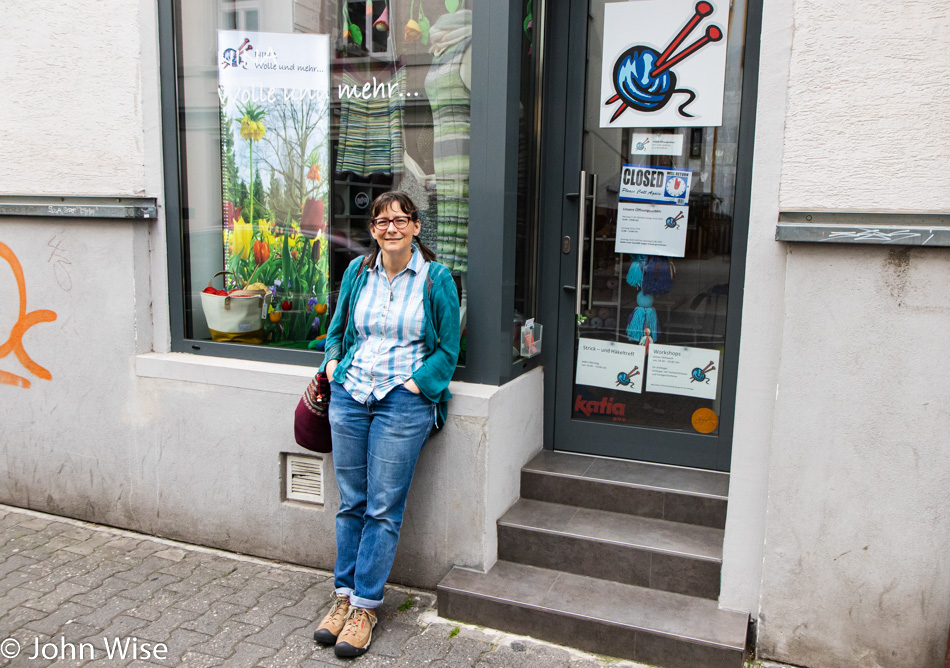
Finally, some private time for Caroline and me, and so we took a nice slow walk down the Bergerstrasse shopping area where Caroline’s impulse to browse was getting its first chance to find her happy place. Our first stop was a 1€ store that was tchotchke heaven, though they also had some great bargains, such as a blanket for only about $1. This shopping area of Frankfurt has always held special sway over Caroline as it was funkier than the commercial core that runs between Hauptwache and Konstablerwache.
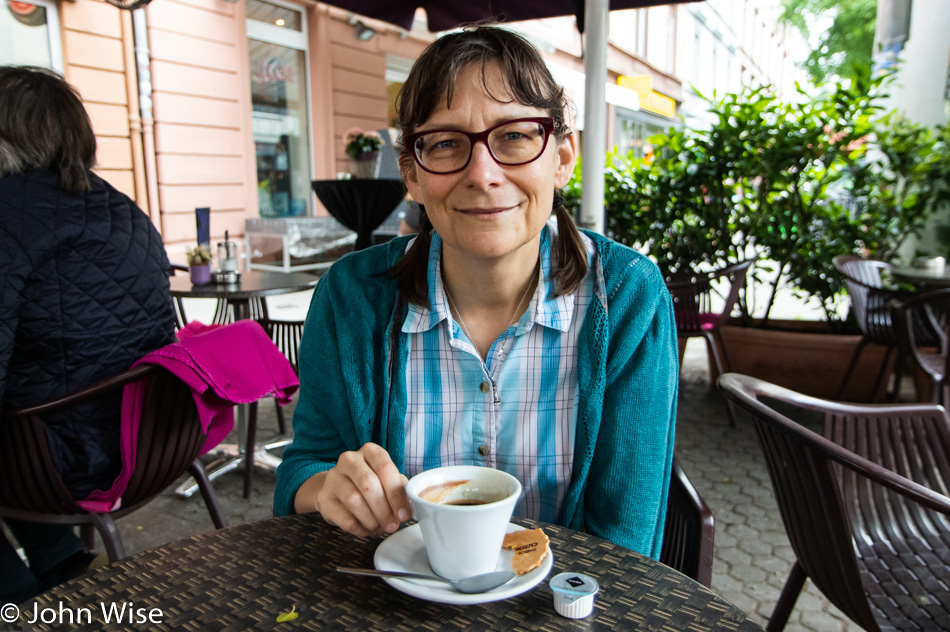
Sharing Spaghetti Ice is de rigueur when we are in Frankfurt, though we cheated on Eis Christina around the corner from where we used to live and went for convenience right here on Bergerstrasse. It was okay, but it wasn’t perfect like our old favorite.
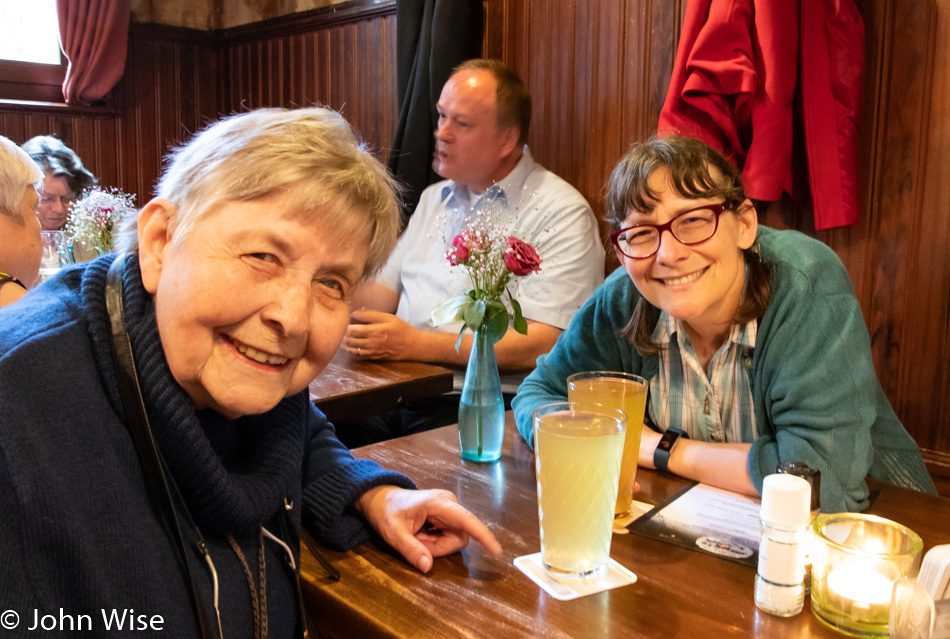
It rained a little bit, but not as bad as was expected or what the thunder portended. A stop at a paper shop let Caroline pick up a bottle of ink she uses for her fountain pen, and a visit to a sock store let her buy some striped socks she missed purchasing during our last visit. I also talked her into buying the Bembel-style socks that are fashioned after the Hessian stoneware jug used for serving Frankfurt’s famous apple wine. Speaking of apple wine, after collecting Jutta following her nap we took a walk around the corner to a spot called Apfelwein Solzer that had some good reviews for traditional German food.
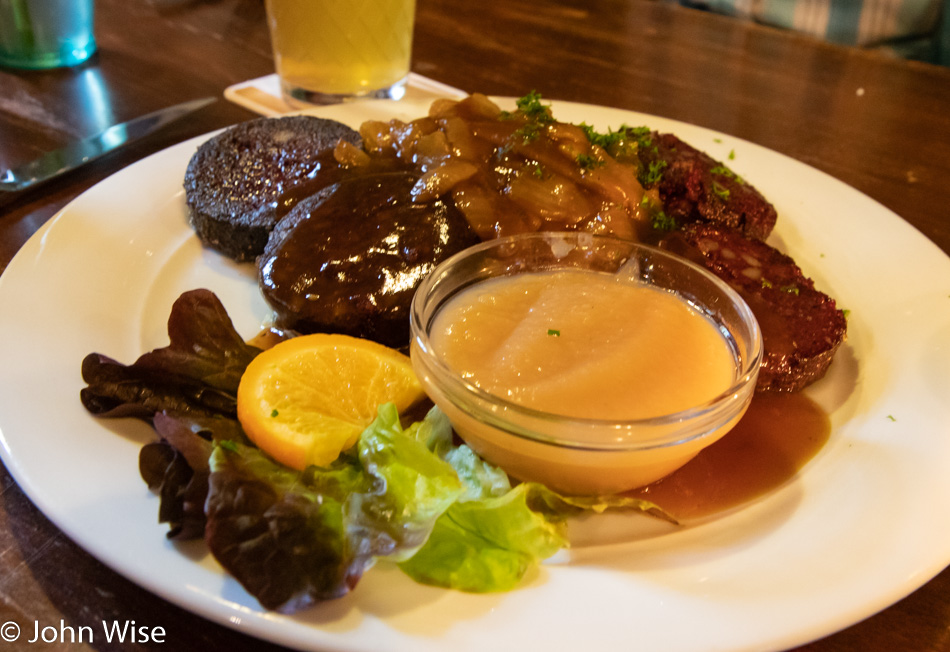
Blood sausage, mashed potatoes, and grilled onions may not be everyone’s idea of yummy German food, but maybe you’d be surprised if you gave it a try. Caroline was satisfied with her iron-rich dinner, while I needed that comfort food group known as fat that only comes with deep frying.
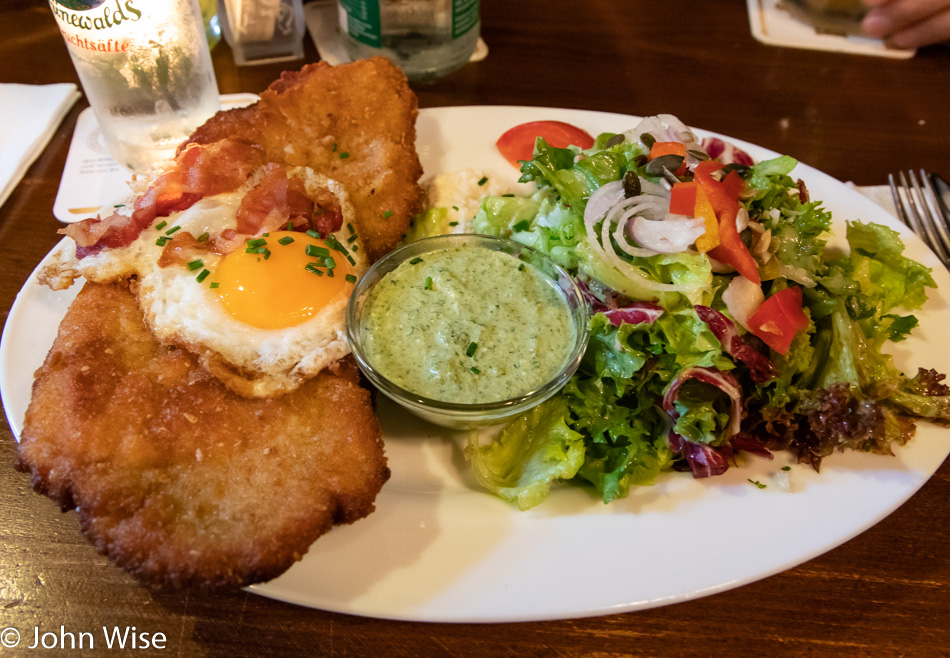
I’m stuck on a green sauce kick that requires me to eat as much of the stuff as I can before leaving the Frankfurt area. Nearly every meal is also starting with Handkäse mit Musik which I’ve probably described half a dozen times before in my blog. A large schnitzel with a fried egg and bacon smiled at my heart as it invited itself into my arteries with gusto.